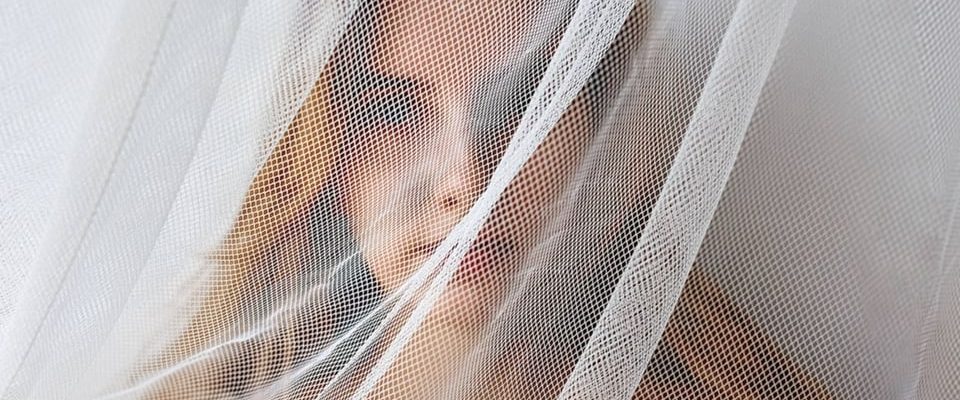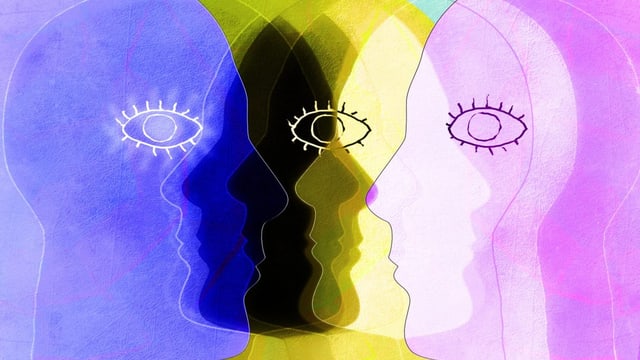It happened again recently, in one of those impersonal open-plan offices. Next door someone is typing intently on his text. To make the impersonal atmosphere a little more personal, introduce myself: “Hi, I’m Reena!”
He looks up, says we already know each other, and continues typing. I’m so embarrassed, I’d like to beam myself away. Once again I couldn’t remember a face.
faces in the wrong place
A few days later I am strolling through Winterthur with Luiza Da Silva. She is at home here and knows many people. Which doesn’t mean that Luiza also recognizes them.
A woman gives us a nice wave. “Do you know her?” I want to know. “Yes,” explains Luiza, “but only because she’s standing in front of her shop. If we had met her somewhere else, I probably wouldn’t have recognized her.” Luiza Da Silva has even more trouble recognizing faces than I do.
Legend:
As if there were a kind of veil over every face: Worldwide, one to two percent of people are said to be face blind.
IMAGO / YAY Images
It becomes difficult, especially with casual acquaintances or if the context is missing. Years ago I didn’t immediately recognize the chef in the studio canteen because he wasn’t standing in front of me in an apron but in baggy pants and a baseball cap.
“But it doesn’t help!”
Not recognizing people is uncomfortable. It comes across as arrogant and inattentive. This is exactly the opposite of what Luiza or I want to be. Luiza Da Silva makes every effort to do something about it: “I pay attention, listen carefully and try to remember the face, but it doesn’t help!”
We are experts on faces we know. It is difficult to tell unknown faces apart.
Ever since Luiza Da Silva first read about prosopagnosia, or face blindness to put it more simply, in an article, she finally has a word for her idiosyncrasy. “I don’t suffer from it,” explains the 65-year-old, “but I’d like to know more about it.” I feel the same.
not recognizing yourself
A few days later, I met one of the leading researchers in facial recognition for an interview: Meike Ramon from the University of Lausanne.
Strictly speaking, only those people who have a brain damage or injury are allowed to call themselves face-blind. An injury affects the network in the brain that is responsible for recognizing faces, explains Meike Ramon.
People without brain damage, like Luiza Da Silva or me, would also have trouble recognizing other things – chairs or bags, for example. As with other differently pronounced talents, it is a naturally occurring variation.
The stranger in the mirror
What do people who have been diagnosed with face blindness see when they look at a face? “Actually, the term face blind is stupid. It’s not like they walk through the world and see headless people,” says Meike Ramon. But for people with prosopagnosia, faces are similar.
So they look for features on faces in order to recognize them. This process is slow as it is searched for feature by feature. In addition, this process is prone to errors. Because conspicuous features such as a piercing or a hairstyle can be changed or removed.
In order to better understand face blindness due to a brain injury, Meike Ramon tells of an experience that a patient had. The woman was traveling in a strange city, strolling through the streets and looking at the shop windows.
Suddenly she was taken aback because a woman in the shop window was staring at her: “She thought: Why is this woman staring at me, that’s cheeky! Then she realized that this woman wears earrings similar to hers.”
Only gradually did the patient realize that she saw herself in a mirrored shop window. The patient did not recognize herself at first.
From an evolutionary point of view, it is probably a novelty that we are exposed to so many faces.
Many scientific studies begin with the sentence that people are experts on faces, says researcher Meike Ramon, contradicting in the same breath: “We are experts on faces that we know. It’s difficult to tell unknown faces apart.”
That also applies to me: I recognize every face in the family album. From the badly lit photo of the great-grandmother to the cousin whose face is almost completely covered by sunglasses and a straw hat.
From Face Blind to Super Recognizers
One to two percent of people worldwide are said to be face blind. However, Meike Ramon does not believe in such numbers because there are no reliable evaluations.
What can be said with certainty, however, is that we are moving on a spectrum. At one end are the people with prosopagnosia who, depending on the situation, even struggle to recognize themselves. Those affected learn to live with it, because face blindness cannot be cured.
Far from it, people like Luiza or me appear on this spectrum. People who have trouble recognizing faces. Especially in the case of fleeting acquaintances or if the context is unfamiliar.
Then there are people who are very good at recognizing faces. Luiza Da Silva tells me about an acquaintance who is the opposite of her: «I am fascinated by his ability to recognize people. Weeks later he recognizes people he has only seen once.”
He probably belongs to the other end of the spectrum, to the so-called super recognizers: people who recognize faces better than a computer program. Such a Super Recognizer works as an investigator for the Winterthur city police.
A life with many faces
When I started researching, I wanted to know why it is so difficult for some people to recognize faces. The more I think about it, a whole different question arises: How many people and their associated faces even fit in one life?
Or to put it another way: Is it perhaps normal that I can’t remember all the many faces that I meet every day in real life and as selfies on the screen?
I say that next time I might not recognize her right away.
I think of our great-great-ancestors, who sat around the campfire with a hand ax and certainly had a much harder time in many things than the modern man of the 21st century. But they encountered fewer people and their faces.
“From an evolutionary point of view, it is probably a novelty that we are exposed to so many faces and images of faces,” says researcher Meike Ramon. “Maybe we have incredibly high expectations of our brain.”
Meeting strategies
It is not a matter of course that we recognize faces – Luiza Da Silva thinks it is good to know that. She has a way of avoiding awkward reunions – she tells people she has trouble recognizing faces: “I say I might not recognize them right away next time.”
How are people reacting to this announcement? “Funnily enough, I’ve seen someone say: I know that too!”


